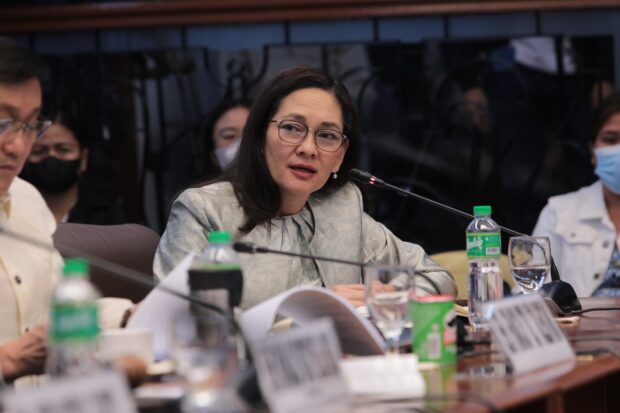
Senate Deputy Minority Leader Risa Hontiveros during one of the Senate hearings. Senate PRIB file photo / Voltaire F. Domingo
MANILA, Philippines — Two resource persons in a Senate hearing on Monday turned emotional as they lamented the continued “social injustice” in the informal sector, particularly among women workers.
While the government’s own records showed that workers from the informal sector contributed P5.013 trillion to the country’s economy in 2016, many of them could not avail of the benefits either from the Philippine Health Insurance Corp. (PhilHealth) or the Social Security System.
And this sorry state of those working in the informal economy was evident during the pandemic, according to Susanita Tesiorna, president of the Alliance of Workers in the Informal Economy.
“Manawagan sa DOF (Department of Finance), naiiyak ako— sa DOF at saka DBM (Department of Budget and Management) and other agencies to take care of the women in the informal sector because they are our backbones in the agriculture sector,” Tesiorna said during the hearing on a bill granting a one-time direct maternity cash aid per delivery to women workers in the informal sector.
(I call on the DOF, I’m about to cry—to the DOF, as well as the DBM and other agencies, to take care of the women in the informal sector because they are our backbones in the agriculture sector.)
The bill was filed by Senator Risa Hontiveros, who presided over the hearing as chairman of the Senate committee on women.
“Napakasakit na isipin na hanggang ngayon, hindi pa rin napapakinggan. There’s so much social injustice for the informal sector specially and even those na hindi na hindi oorganize, unorganizable in the private sector,” Tesiorna went on.
(It is very painful to think that until now, we are still not being heard. There’s so much social injustice in the informal sector, especially for those unorganized or considered unorganizable in the private sector.)
The same is true for most of the more than 6, 000 members of the United Domestic Workers of the Philippines, who have lost their jobs during the pandemic.
According to its secretary general, Himaya Montenegro, 90 percent of its members became unemployed and are now having difficulty availing of the SSS benefits, according to its secretary general, Himaya Montenegro.
Montenegro lamented that while there is already an existing law protecting household workers, it is not properly enforced making their transition from the informal to the formal economy difficult.
“Nahihirapan kaming mag avail dun sa mga benefits po lalo na sa SSS so kapag nawalan po kami ng trabaho hindi po kami makakuha ng employment benefits dahil nga po wala kaming employee at saka employer relationship. Kumbaga hindi kami pumapasa sa requirement ng DOLE (Department of Labor and Employment) na kelangan namin certification ng employer, kailangan ng kontrata para sila magce-certify para ipasa sa SSS para makakuha kami ng benepisyo,” she said.
(We have difficulty availing of the benefits, mainly from SSS. We cannot receive employment benefits when we lose our jobs because we do not have an employee-employer relationship. In other words, we do not meet the requirements set by the Department of Labor and Employment, which include the need for certification from an employer and a contract for them to certify and submit to the SSS for us to obtain benefits)
“Karamihan po sa kanila hindi nakakuha ng ayuda (Most of them did not receive any assistance),” said Montenegro who became emotional before she could even finish her statement.
“At saka ang hirap po talaga sa panahon na yun lalo na po ngayon tapos hindi po kami nakakuha ng ayuda kasi wala daw po kami sa list kahit na nagbibigay na po ang DOLE ng listahan na kasama nga po ang mga kasambahay dun sa pagkuha,” she added.
(It wasn’t easy then, especially now, and we didn’t receive any assistance because we were told that we were not on the list even though the DOLE provided a list that included domestic workers for the aid distribution.)
Hontiveros underscored the importance of her measure, noting that an estimated 250,000 women in the informal economy give birth every year.
“Friends, this is not simply a social justice measure. This is a health measure with meaningful impacts not just for the mothers who can recuperate longer, but also for the infants who will benefit from longer breastfeeding,” she said when she opened the hearing.
RELATED STORIES:
Magna Carta for informal workers pushed anew in House
Informal sector: bane and boon